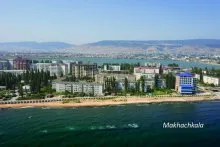
“Makhachkala is a black hole for languages,” he complained when I interviewed him. To me these words were unexpected, because previously I had heard quite the opposite description of his city. I remembered that many people called Makhachkala “a paradise for linguists”, because Dagestan is the most multinational region of Russia, and about 13 or 14 languages belonging to four different language groups are spoken in the streets of its capital. But the translator, whose name I cannot reveal for safety reasons, explained his bitter words.

It is not only in educational matters that the Lak have always been ahead of other Dagestani people groups. The Lak were among the first peoples of Dagestan to accept Islam as their national faith, in the 8th century. They still enjoy a unique position of cultural and religious prestige among their neighbors because of this. And it was on their territories that the anti-religious campaigns of the first years of Soviet power were the most violent. So it is no wonder that today, in a time of cultural revival, the younger Lak generation has resumed its devotion to the traditional religion. Although there are several Christians who are ethnically Lak, it is very difficult to find a Lak who is both a Christian and has a good command of his native tongue. Our exegetical advisor, a Russian man of Evangelical faith who courageously moved to Muslim Makhachkala with his wife and children from a distant part of Russia with the sole purpose of giving the Gospel to one more people group, says that such Lak-speaking Christians can be counted on the fingers of one hand. So it is hardly surprising that, as in many other Caucasian translation projects, other team members belong to Muslim culture if they are young or to post-Soviet secular culture if they are of an older generation.

I could not but smile at the end of this interview. There is no certainty that our translator, who is not a Christian, was consciously remembering Jesus or the Apostle Peter when he spoke his concluding words, but the influence of the two translations (Mark and Matthew) that he had just completed was clearly and undoubtedly manifested.
Isn't this a good prayer for any Bible translator as he is getting into his work, full of unknown hidden reefs: “Lord, if it is You, command me to come to You on the water”?
IBT Russia/CIS is a non-profit organization financed through contributions from individuals, sponsoring organizations and foundations.
You can donate to IBT:
Through: AO UniCredit Bank, Moscow
SWIFT: IMBKRUMM
In favour of: Institute for Bible Translation
Address: 119334, Russia, Moscow, Andreevskaya nab. 2
TIN (INN) 7736231521
9-digit Bank identification code in Russian banking system: 044525545
Account no. (IBAN):
634261 USD 4020 02 001 or 40703840700010142881
634261 EUR 4020 02 001 or 40703978700010366720
634261 GBP 4020 02 001 or 40703826600010366723
Through: NOSTRO ACCOUNTS OF AO UNICREDIT BANK, MOSCOW:
USD JPMORGAN CHASE BANK N.A., NEW YORK SWIFT CODE: CHASUS33
EUR UNICREDIT BANK AG (HYPOVEREINSBANK) , MUNICH SWIFT CODE: HYVEDEMM
EUR UNICREDIT BANK AUSTRIA AG, VIENNA SWIFT CODE: BKAUATWW
EUR UNICREDIT S.P.A., MILANO SWIFT CODE: UNCRITMM
GBP THE ROYAL BANK OF SCOTLAND PLC, LONDON SWIFT CODE: RBOSGB2L
Important! In the field "designation" write "CHARITY DONATION"
For more information address IBT
You may sign up to receive our Russia/CIS monthly English newsletter here
